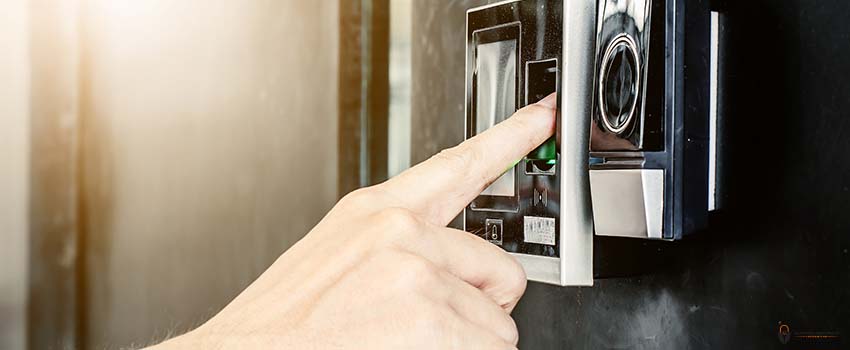When you’re operating a business or attempting to keep your home safe, you understand how important security is. The safety of your employees, commodities, assets and even your family may be jeopardized. As technology progresses in many aspects of our life, the realm of security is witnessing enormous developments in the strategies we may utilize to keep your home or business safe from intruders.
Keys and locks are becoming a thing of the past. We have advanced to the point where we can utilize even more secure techniques to prevent an unwelcome visitor from entering your private zone.
Nowadays, a security mechanism that we only saw in movies – employing iris/eye scans or fingerprints – is becoming increasingly common in everyday situations. They provide improved security, more access management, and more data to help you understand who is visiting your area and when.
Biometric Access Control Systems are what they’re called.
But what exactly are they? Why would you require one? Are there any risks associated with installing a biometric lock?
All of these are reasonable questions. Fortunately, we at Alexius Denver’s Locksmiths are here to assist you in obtaining your answers. Let us take a look.
What Is A Biometric Lock?
Biometric access control systems are a sort of keyless locking mechanism that uses a person’s biological identity features to permit them entry to a variety of locations. They are always positioned at a point of entry or access, which is any door, turnstile, elevator, or garage door that may be used to manage admission to a room or location.
Numerous electronic access control systems currently exist and enable entrance with identification such as a key card, driver’s license, or passport. These are less protective since they, like keys, may be misplaced, stolen, or duplicated. When attempting to create a completely secure locking system, you must look for anything that is less easily exploited by someone who should not have access.
Biometric access control solutions provide just that.
The “key” you use to access your locks has now become a part of you. The measurements’ data is saved in a digital database, and when the system discovers a match to an authorized individual, the locking mechanism immediately releases. Among the biometric data kinds that can be used are the following:
- Palm: Infrared light is used to scan the unique vein system of a person’s hand.
- Fingerprint: Because everyone understands that fingerprints are unique, it’s only logical that they’d be employed in biometric systems.
- Iris Scan: Every retina is unique, the same as a fingerprint. These, too, can be scanned.
- Voice verification: Because each person’s voice is unique, it may be used to identify them.
- Facial scans: Our technology can now recognize a person’s face, allowing it to be utilized for identification.
We’ve learned a bit about biometric locking methods. The reason you should utilize them, though, may be less evident. Let’s take a look at why they’re so effective.
Why Do We Need Biometric Access Control?
There are several reasons why a biometric lock structure is becoming increasingly popular for access control systems.
- Control: One of the most significant advantages of biometric entry control is the enhanced control it provides over your doorway. It’s critical to understand who has access to which locations and when especially if you own a business. This can assist you in keeping track of staff hours as well as who has accessed which buildings on your property and when. When you utilize a biometric lock system, you never have such clarity about these things.
- Convenience: Forgetting your key at home, losing a key card between your vehicle seats, or forgetting an access code are all things of the past. You don’t need anything else to enter a facility with biometric entry systems other than your own body. This makes it quite simple for anyone who should have access to a door to open it. When building a system in your home, this may be especially beneficial for your children, who could easily misplace their house keys and become locked out.
- Reliability: Even though these systems rely on electrical and digital technologies, they are pretty dependable. The locking mechanism instantly unlocks when you scan your identity, allowing you rapid access. It will also remain secured during a power outage, preventing someone from entering when the lights go off.
- Biometric security: These systems are quite efficient. There’s no need to be concerned about someone stealing a key or key card or forgetting an access code. Only those who are meant to be able to open a lock may do so. The systems are also highly resilient, hard to pick, and unhackable. The makers of biometric access control systems have thought of everything.
As stated, there are several advantages to adopting a biometric lock system, like not needing to misplace keys or recall constantly changing access passwords or codes. All they need is biometric data, such as your fingerprint, palm, or retina scan.
These systems provide improved theft protection. When the door is closed, it automatically locks and requires biometric data to be entered again to unlock. Using certain locks, you may limit as much or as little area as you like, with information from a few to even 50 individuals.
This biometric door lock system is simple to install, program, and operate for homes and businesses. A biometric door lock can also be readily integrated into practically any style of door today. The most complex models allow you to see a user’s entry and exit history.
What Could Be Problems With Biometric Access Control?
The risks associated with biometric access control solutions are surprisingly low! Any other form of locking system is less secure than the door itself.
The storage of personal biometric data poses potential hazards. Strong encryption must be used to secure all data from hackers. Once a biometric indication is hacked, it is permanently compromised. Passwords and access codes can be altered, but fingerprints and irises cannot. As a result, it’s critical to safeguard the information that opens your doors.
Despite these concerns, the safety and accessibility benefits of a biometric lock system greatly exceed the hazards.
Upgrade Your Security System With Us Today
Contact Alexius Denver’s Locksmiths if you wish to implement keyless entry systems in your commercial enterprise. We can supply you with any type you require, including biometric readers, keypads, and proximity scanners for ID cards and badges. This sort of lock system is also repaired and replaced by us.
Alexius Denver’s Locksmiths offers decades of experience defending your home and family. Schedule a consultation now with our expert locksmith in Denver for a security system that is an excellent match for you and your house.






